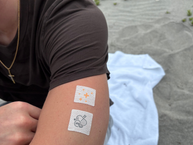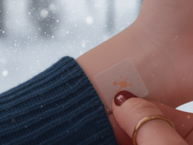Vitamins are essential for good health, and it’s no surprise that they are necessary for the largest organ in your body: your skin. Aside from basic precautions, such as using sunscreen when you are outside, you can support skin health by making sure you have adequate amounts of key vitamins. Vitamins C, D, E, and K are some of the most critical vitamins for your skin.
Here’s what they do, where to find them, and how to get more if you need them, such as by using PatchAid Vitamin Patches.* Be sure to ask your healthcare provider before using any nutritional supplement.
Vitamin C
Vitamin C is important in proper immune function,* which you may know due to its popularity in cold and flu products. Vitamin C also helps your body absorb iron and calcium from food. What you may not realize is its roles in skin health.
VItamin C is also an antioxidant and an essential nutrient for producing collagen. These are both critical for skin health. As an antioxidant, vitamin C helps protect cells, including skin cells, from damage by compounds called free radicals.* As a promoter of collagen production, vitamin C is needed for keeping skin tight and strong.* You might think of collage as helping your skin stay youthful-looking.
Vitamin C is in plant-based foods, especially fruits and vegetables. Fruits with vitamin C include kiwi, berries, citrus fruit such as oranges, grapefruits, and clementines, cantaloupe, peaches, pineapple, and mangos. Vegetables include bell peppers, potatoes, tomatoes, onions, green vegetables, and cauliflower.
If you’re not a big fan of eating fresh fruits and vegetables, you may be low in vitamin C. Smokers can also have low levels. Plus, some people believe that getting more vitamin C is a good idea.
The Vitamin C Plus Patch by PatchAid has 2,500 mg of vitamin C, or 2,778% of the daily value. Sources of vitamin C in the patch include acerola cherries and rosehip. Other ingredients are citrus bioflavonoids, alfalfa, barley grass powder, and another flavonoid called rutin.
Vitamin D
Vitamin D may best be known for bone health because of its roles in helping to absorb and use calcium, but it’s also important in supporting breast, prostate, and heart health, not to mention that low levels of vitamin D are linked to higher risk for that low levels are linked to autoimmune conditions, including psoriasis.* That’s a condition with uncomfortable inflammation of the skin and symptoms such as dry, itchy, or raised skin.
Vitamin D is also called the “sunshine vitamin.” That’s because your body can make it when UV radiation from the sun hits your skin. Your skin, liver, and kidneys are all involved in synthesizing vitamin D3, which is the active form of vitamin D in your body.
Natural food sources of vitamin D included fatty fish and egg yolks. Fortified milk is another source, and some fortified cereals, orange juice, and non-dairy milk substitutes can also have vitamin D.
Although you can get vitamin D upon sun exposure, vitamin D deficiency is common for several reasons.
- Older adults and people with darker skin have less ability to make vitamin D.
- People often use sunscreen or wear clothing that blocks UV radiation.
- There aren’t many natural food sources of vitamin D.
- Sunlight in northern climates in winter months does not deliver much UV radiation.
Supplements can help if your levels are low or you have risk factors for low levels.* PatchAid Vitamin D3 Patches have more than 5000 IU of vitamin D. They also come with bone-promoting nutrients, such as calcium, magnesium, and vitamin K.
Vitamin E
Vitamin E is essential for optimal heart health. It’s also an antioxidant, which lets you know that it is important for protecting skin cells against harmful free radicals. It may also be protective against dark spots and wrinkles linked to sun exposure.*
Healthy fats have vitamin E. Nuts, peanuts, and seeds all have vitamin E. So do their oils and other plant-based oils, such as canola oil. Because of the way vitamin E affects oxidation of fats, people who have a high-fat diet may need more vitamin E. That can include people who are on low-carb or keto diets. The PatchAid Multivitamin Plus Patch and Anti-Aging Patch both have more vitamin E.
Vitamin K
Vitamin K is named after its best-known role, which is in supporting blood clotting. Vitamin K is named for the German word, “koagulation,” for coagulation. Without enough vitamin K, you’re likely to get excessive bleeding and, very relevant to skin health, excessive bruising. Stretch marks, scars, and spider veins may also appear without enough vitamin K.*
Vitamin K is in leafy green vegetables, such as collard and mustard greens, kale, spinach, and romaine lettuce. It’s also in fermented foods, such as miso and natto.
If you’re looking to add more vitamin K, consider the Vitamin D3 with K2 Vitamin Patch. It has vitamin K2, which is the form found in fermented foods and which is less common in the diet.* It also has calcium, vitamin D3, and magnesium.
General Skin Health Tips
Along with nourishing your skin with vitamins, you can take care of your skin with some basic steps. These are some ways to promote general skin health.
- Use a broad-spectrum sunscreen with an SPF of at least 30 every time you plan to spend time outdoors.
- Wear protective clothing and stay in the shade to reduce UV exposure from the sun.
- Use a mild soap and dry your face with a clean towel.
- Limit harsh beauty products.
- See a dermatologist to get a baseline assessment of features such as moles and birthmarks, and follow up as recommended to evaluate any changes.
- Keep an eye out for redness, scaliness, or other signs of unhealthy skin.
Talk to your healthcare provider about skin health to see if there are other steps you should take.
Healthy skin can look radiant and glowing, but your skin needs proper nutrition to look its best. Vitamins C, D, E, and K are four vitamins involved in skin health,* and they are in PatchAid Vitamin Patches. Ask your doctor which patches may be best for you to use to support healthy skin and other goals.
*The Food and Drug Administration has not evaluated these statements. PatchAid patches are not intended to diagnose, treat, cure or prevent any disease. Anyone with a medical condition should seek the advice of a licensed medical practitioner. Individual results may vary.







